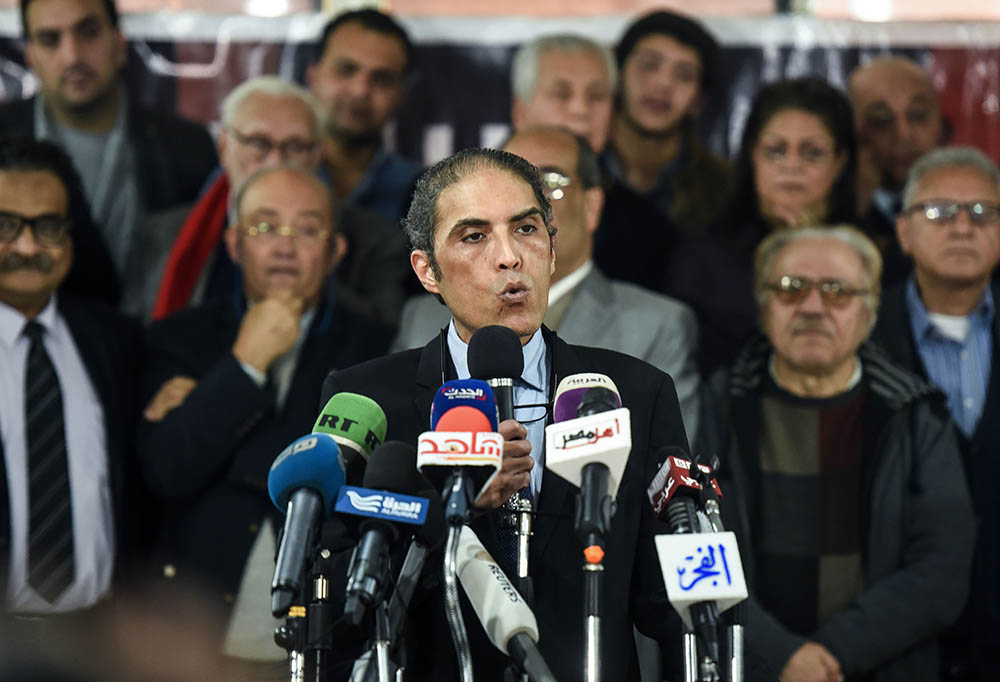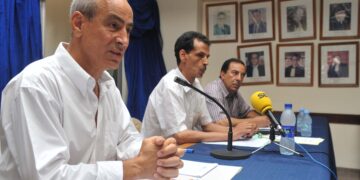Summary
As Egypt's National Dialogue slowly moves forward, opposition figures must decide whether the benefits of participating in this tightly-controlled political process outweigh the risks. While there are strong arguments for participation and for boycott, participating in the National Dialogue can counter government claims that the opposition refuses to engage, and still allow for principled criticism without conferring legitimacy on President Sisi or the government.
Recommendation
Opposition leaders inside and outside of Egypt should maintain solidarity and avoid allowing their differing approaches and rationales for participation in or boycott of the National Dialogue to divide them and serve as a distraction from the Egyptian government's inability to address the human rights, governance, and economic crises that it has created. All sides should allow the process to unfold and respect the arguments of one another to obtain whatever political and human rights gains are possible in this narrow window.
Background and Methodology
Egypt's National Dialogue is designed to provide a forum for a diverse group of participants, including political and social leaders, to address the country's political, social, and economic crises and spur meaningful discussion on how best to chart the country's future. Critics oppose it as a process lacking in substance and designed to give the appearance of doing something, even as the government maintains its repressive grip on Egyptian society and political activity. Critics also believe that the process is little more than a ploy to distract Egyptians from the country's economic crisis. Supporters defend the process as a genuine effort toward reconciliation and an opportunity to make limited gains in opening Egypt's closed political space. Although scheduled to begin in the first week of July, the National Dialogue remains delayed as its Board of Trustees continues to make final preparations on the topics and format of the process.
The National Dialogue Administration appointed the Board, composed of nineteen members, on June 26. The Board includes members of parliament, former government officials, university professors, journalists, and business and civil society leaders who were appointed after a 20-day consultation with Egyptian politicians, trade union officials, and other representatives expected to participate in the National Dialogue. After an initial meeting on July 5, the Board held its second meeting on July 19 and agreed that the National Dialogue will focus on three tracks: political, social, and economic. At a press conference following the July 19 meeting, National Dialogue General Coordinator Diaa Rashwan, who also serves as Head of the State Information Services and Journalists Syndicate, announced that the political track will focus on three topics: political rights, legislative representation and political parties, and human rights and public freedoms. The Board also assigned a subcommittee to each topic.
The Board met again on July 30, where it focused on the social track and agreed to form subcommittees addressing five topics: education, health, population, family issues and community cohesion, and culture and national identity. During this meeting, Rashwan reiterated the intended practical effect of the dialogue, which must culminate in proposals for legislative or executive reforms to present to Egyptian President Abdel Fattah El-Sisi. The Board also agreed to set a timeframe of no more than six months for the National Dialogue to complete its work.
On August 3, the Board met to focus on the economic track and formed seven subcommittees to address the following issues: (1) inflation and price hikes, (2) public debt, budget deficit, financial reforms, (3) public investment priorities and state ownership policy, (4) local and foreign private investment, (5) industry, (6) agriculture and food security, and (7) social justice. Having formed subcommittees for the three tracks, the Board will meet next on August 27, when it will make additional preparations before beginning the dialogue's substantive sessions.
Rashwan has stated that "all Egyptians" are invited to participate in the National Dialogue, although this invitation excludes members of the Muslim Brotherhood, which the government considers a terrorist organization. The exact number of participants is unknown, but Mahmoud Fawzy, Head of the National Dialogue's Technical Secretariat, stated that the National Training Academy (NTA), which is the organizational home of the National Dialogue, has received 96,532 applications. Egyptians also can participate by submitting questions and ideas to the NTA website. Nonetheless, who will and will not be allowed to participate in the National Dialogue remains a contested issue, but the Board stated that those released from prison, including by presidential pardon, would be welcome to participate.
Transparency also remains a concern, as despite pledges from Rashwan to broadcast the National Dialogue sessions, the Board has refused to broadcast its own meetings or make them open to journalists and the media. During its five-hour closed-door meeting on July 19, the Board prevented about 200 journalists and broadcasters from covering the meeting as it happened. Whether the National Dialogue sessions will be broadcast, as the organizers promised, remains to be seen, but Rashwan has stated that unlike the board meetings, the sessions will be aired live.
DAWN reviewed commentary, analysis, and public records, including statements published by the National Dialogue Board of Trustees, and spoke to several commentators, Egyptian human rights lawyers, and political exiles, primarily based in Istanbul, to complete this briefing paper.
DAWN reviewed commentary, analysis, and public records, including statements published by the National Dialogue Board of Trustees, and spoke to several commentators, Egyptian human rights lawyers, and political exiles, primarily based in Istanbul, to complete this briefing paper.
Analysis
On April 26, near the end of Ramadan, Sisi announced that the Egyptian government would hold a National Dialogue for the purpose of national reconciliation and as a step toward legislative and executive reforms that will follow. Sisi made this announcement while attending the Egyptian Family Iftar, a tradition that he began in 2017, where he invites key government officials, politicians, journalists, and other prominent figures to join him in a ceremonial meal to break the fast during the last week of Ramadan. The event included a number of political opposition figures tolerated by the government, such as former presidential candidate Hamdeen Sabahi and longtime journalist and former head of the Dostour (Constitution) Party Khaled Dawoud. On the same day, Sisi also announced his decision to reactivate the Presidential Pardon Committee to consider the release of political prisoners.
The Sisi government put forth both initiatives during the National Youth Conference, an event it first organized in 2016 for the stated purpose of connecting youth leaders with government officials and familiarizing them with state institutions. Although officially characterized as an opportunity for Egyptian youth to engage in constructive criticism of the government, many young Egyptians mocked this idea, and simultaneously held their own online youth conference. Sisi hoped to use this year's conference to bolster his popularity with young Egyptians, many of whom face unemployment or underemployment in Egypt's struggling, overextended economy.
Sisi's call for a National Dialogue comes as the country's social fabric continues to fray and the already poor economic conditions worsen. Tens of thousands of political prisoners, as well as journalists, human right defenders, and civil society leaders, remain jailed. Human rights organizations and foreign governments, including the United States, regularly note the deteriorating conditions within the country. Economically, Egypt's external debt is now an unprecedented $157.8 billion, an increase of $23 billion from 2021. Egypt's total debt is even higher, reaching $392 billion at the end of the 2020–2021 fiscal year. Egypt now ranks 158 out of 189 countries in debt-to-GDP ratio, meaning that a significant amount of the government's financial resources is spent servicing debt instead of providing services to the Egyptian people. Although Sisi's grip on power remains near absolute, it is also clear that the government has decided that it needs to make positive gestures to the Egyptian people to quell public dissatisfaction about the country's dire political, social, and economic conditions.
Egyptian commentators have debated publicly, primarily on social media, whether the National Dialogue will be a serious effort to repair social relations, or a vacuous act of political theater. Whether the government is sincere about reopening public space to allow at least de minimis discussion over political reform and human rights and whether Sisi's political opponents decide to participate in the National Dialogue will begin to determine the answer to this question. But even then, absent concrete measures to show at least some measure of reconciliation, serious doubts will remain as to the government's sincerity.

Khaled Dawoud speaks during a press conference on the Egyptian opposition in Cairo on January 30, 2018, ahead of the March presidential elections. (Photo by MOHAMED EL-SHAHED / AFP) (Photo credit should read MOHAMED EL-SHAHED/AFP via Getty Images)
Source: Getty IMages
Reactions to the formation of the National Dialogue have varied between Sisi's supporters and critics. Opposition political leaders inside and outside the country have differed in their views, with some supporting participation in the National Dialogue and others urging boycott. These leaders have competed for attention in Egypt's public discourse and especially on social media. For the political opposition inside Egypt, criticizing the National Dialogue is a fraught activity, as any criticism of the government can have serious repercussions, no matter how slight the critique. While the government may tolerate some criticism of the process, opponents inside the country cannot speak freely when commenting on the National Dialogue, nor condemn the process outright, and red lines, such as direct criticism of Sisi or the military, remain in effect and are not to be crossed. In all cases, for the opposition inside and outside of Egypt, using the National Dialogue to secure the release of political prisoners is a key consideration.
The Political Prisoner Question
Since coming to power in a 2013 military coup, the Sisi government has detained and arrested tens of thousands of Egyptians through systemic repression and a brutal crackdown on civil and political rights. Human rights organizations estimate that there are at least 60,000 political prisoners in Egypt, many of whom have not received a fair trial or even been tried, as their charges are simply recycled into different cases through the government's abusive use of pretrial detention. These oppressive practices and diminished political space have all but eliminated any belief in the Sisi government's genuine desire to allow meaningful political reform. And despite Sisi's assurances to "accommodate all" and allow "for difference of opinion," this pronounced lack of trust casts a shadow over the National Dialogue. In response, numerous opposition figures and human rights organizations have called for the release of a significant number of political prisoners as a precondition for their participation in the National Dialogue.
Khaled Dawoud, for example, welcomed the dialogue, but reiterated the need for the government to release political prisoners as a measure of good faith before the dialogue began. "[W]e will be in a very unenviable situation if we participate without the release of our members from prison. We need that to happen as a gesture of goodwill from the government." Dawoud spent more than eighteen months in pretrial detention after being charged with spreading false news and aiding a terrorist organization before the government released him in April 2021.
While Sisi officially denies that there are any political prisoners in Egypt, the Egyptian government did promise to release or pardon a number of detainees before the start of the National Dialogue, primarily to serve as a confidence building measure for the opposition and to show its sincerity for considering reform. As Rashwan said, "The pardons pave the way for the National Dialogue to take place in a convenient atmosphere."
Thus far, however, the government has released far fewer detainees and political prisoners than opposition figures and civil society leaders expected. A group of Egyptian human rights lawyers told DAWN that the government has released 316 political prisoners, but detained at least 400 more since Sisi announced the National Dialogue on April 26. Amr El Afifi, a noted Egyptian researcher and Research Manager of The Freedom Initiative, provided a higher number, reporting the government has released 432 people, but detained 716 more, meaning that for every release, the government detained 1.6 more people. Tarek al-Awady, a member of the Presidential Pardon Committee, said that just under 300 detainees had been released from a list of 1,074 names submitted to the committee from the Civil Democratic Movement (CDM), the largest opposition group in Egypt, in the first two months since Sisi announced the National Dialogue.
These figures are considerably lower than the one Rashwan provided on July 29, when he claimed that the government had released more than 700 prisoners through the Office of the Public Prosecutor or by presidential pardon. Following Rashwan's claim, Fatima Khafaji, also a National Dialogue Trustee Board Member, said that the actual number is 400. Khafaji noted that this is well short of the 1,074 that the CDM established as a precondition for members of the movement to participate in the dialogue.
Further, on July 27, seven leading Egyptian human rights organizations submitted a second list of detainees to the Presidential Pardon Committee. This list names 536 individuals and follows the first list the organizations submitted on May 23, which named 2,418 individuals. To date, the government has released only 49 of the 2,418 individuals, or less than 2 percent. Similarly, on August 8, Till the Last Prisoner reported the release of 443 detainees, while 25 detainees had their charges recycled into new cases. It also reported that the government had arrested 716 people and renewed the pretrial detention of 7,000 detainees.
Since coming to power in a 2013 military coup, the Sisi government has detained and arrested tens of thousands of Egyptians through systemic repression and a brutal crackdown on civil and political rights.
The Presidential Pardon Committee is preparing to submit a third list of names to Sisi, but on August 15, committee member Kamal Abu Aita said that security agencies are obstructing the committee's work to such an extent that it has "almost stopped." The following day, committee member Tarek El Khouly stated that Egyptian officials would release 25 detainees from pretrial detention.
In all these instances, the Egyptian government has released only a fraction of the detainees or political prisoners that civil society and human rights groups have requested. As the start of the substantive sessions of the National Dialogue nears, opposition figures and other prospective participants will need to decide whether to join the dialogue, to refuse, or to try to delay the start until the government agrees to release more detainees and political prisoners.
Critics of Participation in the National Dialogue
Those rejecting participation in the National Dialogue include most exiled Egyptian politicians and political activists. These voices largely maintain that the government is not serious about conducting a meaningful National Dialogue, and note that since Sisi's promise of prisoner releases at the Egyptian Family Iftar, the government has released only a few political prisoners, while influential human rights defenders, such as Alaa El Fattah and Mohamed El Baqer, remain imprisoned. Of the 300 to 400 detainees released since the announcement, only a fraction are prisoners detained on political grounds. Some political exiles also told DAWN that the National Dialogue should be completely delinked from the release of political prisoners, as their human rights and fundamental freedoms cannot depend on any political process or negotiation.
Critics of the National Dialogue also note that some of the country's most important political leaders, such as former presidential candidate Abdel Moneim Aboul Fotouh, remain imprisoned, which undermines the sincerity and significance of a National Dialogue meant to repair social and political division.
Politicians within the country such as Ahmed al-Tantawy, head of the Al-Karama (Dignity) Party, rejected participation within the National Dialogue, as they concluded the government was not serious about reform and participation would lend undeserved legitimacy to the regime. Al-Tantawy resigned from the Al-Karama Party, one of the few opposition parties allowed to exist in Egypt, on July 16, after the government banned an article he published in Al-Manassa that examined how a president could be removed from office under Egyptian law. This led the government to block the media outlet, the thirteenth time it has done so since 2017.
Al-Tantawy left Egypt for Beirut in late July, after Egyptian officials sent multiple messages to Al-Karama Party founder Hamdeen Sabbahi asking for al-Tantawy to withdraw from political life. Mada Masr reported that the official claimed al-Tantawy's criticism of the National Dialogue could "derail progress" and promised the release of "hundreds of detainees" in return. Those close to Al-Tantawy urged him to leave the country before he faced government reprisal.
Citing this and other points, many political exiles conclude that the Egyptian government resorted to proposing a National Dialogue simply as an attempt to brush aside the country's current political and economic woes. Accordingly, political exile communities in Berlin, Doha, and Istanbul largely view the National Dialogue as an exercise in deflection, where Sisi and his inner circle hope to preempt internal and external criticism as they attempt to deal with the country's unprecedented economic crisis. Several commentators reach the same conclusion. As Mohammad Fadel recently noted, "the structure of the proposed 'dialogue' confirms that it is just another attempt to put up a veneer of political openness to deflect Western criticisms of Sisi's regime and its human rights record." Fadel also notes that the Sisi government hopes to use the National Dialogue to "buttress its international image in the context of an increasingly deteriorating international climate, in which the Egyptian economy is likely to require another round of loans from the International Monetary Fund in the near future."
Supporters of Participation in the National Dialogue
Those advocating for participation in the National Dialogue argue that in a repressive country marked by closed political space, such as Egypt, participation in state-sanctioned political processes affords the only opportunity to demand change and call for political reform—however short-lived these opportunities or unlikely the government is to heed these calls. Supporters also argue that participating in the National Dialogue is an important means to secure the release of as many political prisoners as possible, a crucial pragmatic goal, particularly given the unlikelihood of meaningful political reform following the dialogue. As one political exile told DAWN, "The release of any political prisoner is a victory for freedom in Egypt."
Moreover, supporters argue that participating in the National Dialogue as opposition voices does not legitimize the government or this process, and refusing to participate allows Sisi to proclaim that he invited the opposition to dialogue and they refused. Sisi will use this argument, no matter how specious, to refute claims that he and his government are not addressing human rights. Not only does this allow Sisi to shape the narrative of Egypt's human rights crisis, it could provide Western countries, such as the United States and EU member states, enough of a fig leaf to continue supplying the Sisi government with billions in weapons sales and military support.
At this point, there are few opposition groups that support participation without greater concessions from the government. For example, on August 10, human rights lawyer Negad El Borai presented Rashwan with a letter from 19 prominent human rights defenders that concluded the Egyptian government must honor constitutionally guaranteed human rights for the dialogue to succeed. The letter proposed four steps for the government to take to demonstrate its sincerity toward reform: improving the legal and administrative framework for NGOs; ending prosecutions, travel bans, and asset freezes of human rights defenders; freeing unjustly imprisoned human rights lawyers, including El Baqer and Haitham Mohamedain; and ending the practice of detaining Egyptians at airports or delaying passport renewals for those living outside of Egypt, a which effectively uses travel restrictions as a weapon against human rights defenders.
The Egyptian government has not yet agreed to these or other suggestions for confidence building measures, leaving the small trickle of detainee releases as the only measure of its sincerity toward hosting a National Dialogue with genuine intent for reform.
Conclusion and Recommendations
Only loyalist Egyptian government officials and Sisi apologists show any real enthusiasm for the National Dialogue. Nonetheless, whether to participate or not is a difficult question for Egyptians, and especially for political and social leaders within Egypt who risk alienating the government and all the harms that can follow if they reject participation or criticize the process too severely. Both supporters and opponents of participation raise valid arguments. The possibility of making some gains in Egypt's human rights crisis and securing the release of even a limited number of detainees and political prisoners is a compelling reason to participate. Likewise, publicly expressing dissatisfaction with Sisi and his corrupt regime, no matter how muted, is a welcome prospect for many Egyptians and may lead to less restrictive civil society and greater democratic political openings in the future. And since the opposition, both inside Egypt and in exile, know that the National Dialogue is extremely unlikely to result in meaningful change or more than very limited gains, there is perhaps little reason not to participate.
Clearly, this political process, assuming it ever starts, lacks credibility as a meaningful effort by the government to relinquish its authoritarian control and lessen its near absolute political repression in the country. Participation in the National Dialogue should not confer legitimacy on it, and deciding whether to participate or not should remain a personal choice and not subject participants to attack. Here, what matters most is solidarity. Opposition leaders should respect one another's decision to participate or boycott, remain focused on evaluating the process on its merits, and genuinely critique it if it concludes as nothing more than a process to appease Western governments and distract from the country's crippling economic crisis, a crisis the government largely brought upon itself.
Lastly, this moment offers opposition leaders who have often been criticized for an inability to work together an opportunity to show that they can cooperate and that their views on the most important issues in Egypt are reinforcing and complementary, not contradictory. It also provides them with an opportunity to show their fellow Egyptians that Sisi's authoritarian rule does not need to be the model forever foisted upon them and that more inclusive, democratic, and peaceful possibilities exist. This is something that all Egyptians should want.




































